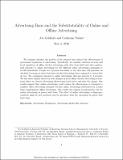Advertising Bans and the Substitutability of Online and Offline Advertising
Author(s)
Goldfarb, Avi; Tucker, Catherine Elizabeth
Downloadhttp://papers.ssrn.com/sol3/papers.cfm?abstract_id=1600221 (427.2Kb)
OPEN_ACCESS_POLICY
Open Access Policy
Creative Commons Attribution-Noncommercial-Share Alike
Terms of use
Metadata
Show full item recordAbstract
The authors examine whether the growth of the Internet has reduced the effectiveness of government regulation of advertising. They combine nonexperimental variation in local regulation of offline alcohol advertising with data from field tests that randomized exposure to online advertising for 275 different online advertising campaigns to 61,580 people. The results show that people are 8% less likely to say that they will purchase an alcoholic beverage in states that have alcohol advertising bans compared with states that do not. For consumers exposed to online advertising, this gap narrows to 3%. There are similar effects for four changes in local offline alcohol advertising restrictions when advertising effectiveness is observed both before and after the change. The effect of online advertising is disproportionately high for new products and for products with low awareness in places that have bans. This suggests that online advertising could reduce the effectiveness of attempts to regulate offline advertising channels because online advertising substitutes for (rather than complements) offline advertising.
Date issued
2011-04Department
Sloan School of ManagementJournal
Journal of Marketing Research
Publisher
American Marketing Association
Citation
Goldfarb, Avi, and Catherine Tucker. “Advertising Bans and the Substitutability of Online and Offline Advertising.” Journal of Marketing Research 48.2 (2011): 207-227.
Version: Author's final manuscript
ISSN
1547-7193
0022-2437